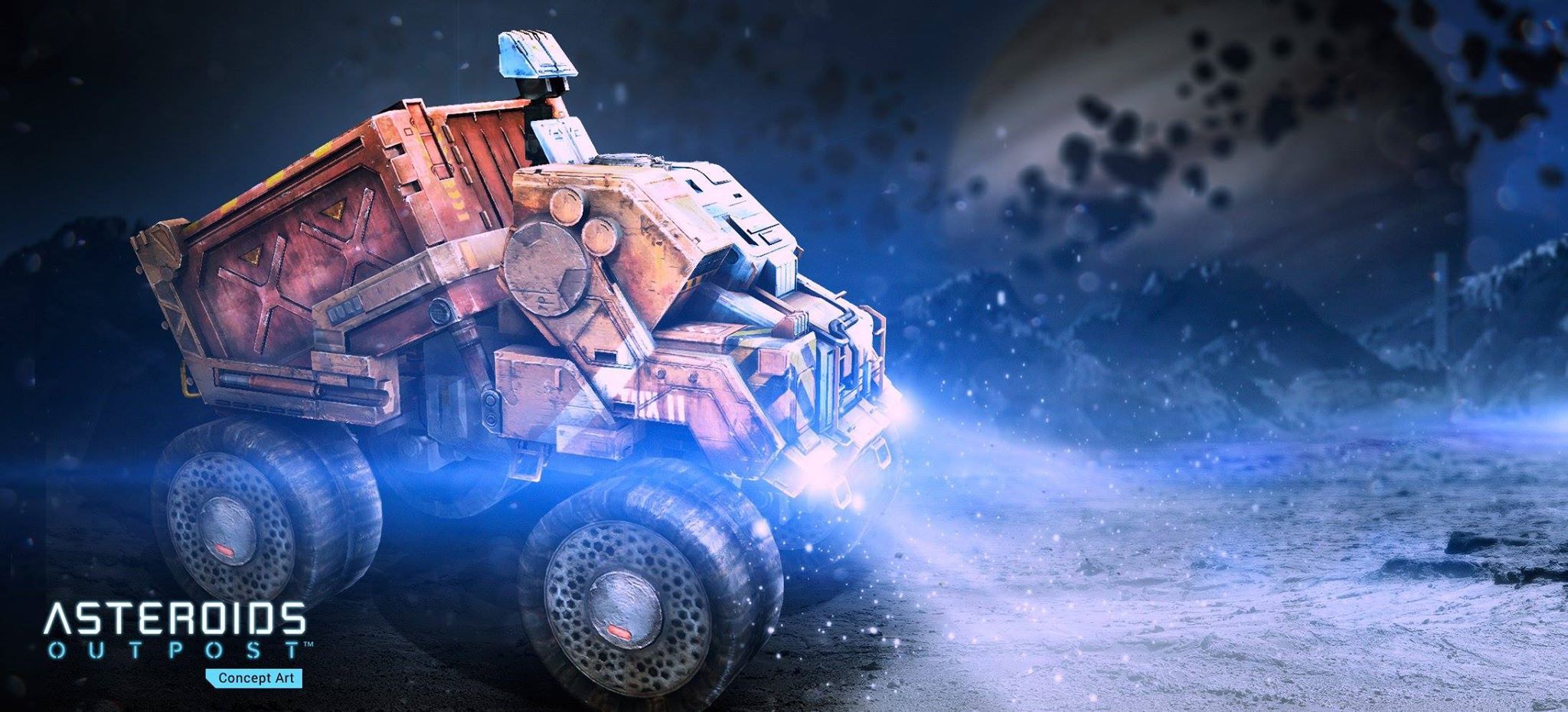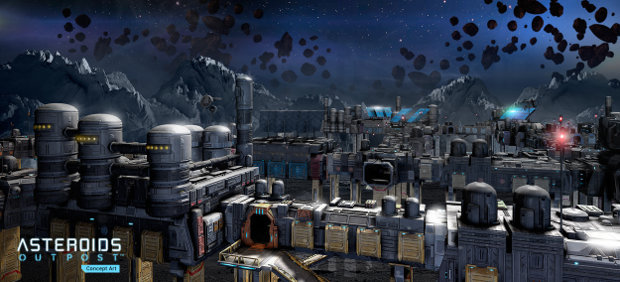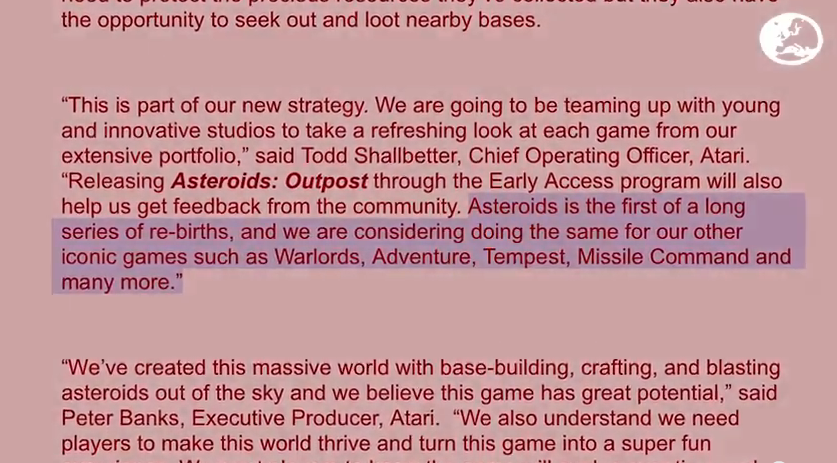What's going on in Asteroids Outpost?
No, seriously.
There's a lot that is strange about Asteroids Outpost, but the most obvious is surely the way this supposed evolution of Atari's 1979 arcade game has literally nothing in common with its classic ancestor.
In the original, you guided a triangular spaceship around a black play area, shooting large asteroids which then broke into smaller asteroids, which then broke into...and so on. It was simple, ingenious and one of those early game concepts that still works perfectly today.
In this bizarre spin-off, you play a space miner foraging for ore on an airless moon in a sort of base-building, tower defence, first-person shooter multiplayer sandbox thing, a jumble of genres and ideas that very rarely coalesces into something that makes sense.
To be fair, this is very early access indeed. It's pre-alpha, which means that any criticisms can be at least partially deflected by the knowledge that almost everything is incomplete. On the other hand, Atari is happy to charge £24.99 for the experience, so it clearly thinks there's already something here of value to gamers.
Here's what happens: you start the game by choosing a server, then selecting a spot on the map to stake your claim. You then get to choose the location of your base, and add a large turret to it. Then the game drops you into first-person mode and leaves you to get on with it. "It" in this case being the destruction of the meteorites - not asteroids - that are constantly falling around you, in order to extract their ore.
Even just getting this far means suffering some pretty egregious bugs and deciphering some opaque instructions, however. Placing your base is a clumsy affair, and if you click away the tutorial text box before committing to a spot, you may even find you can't even get started. Picking a spot is frustrating, thanks to a map that doesn't scroll, often displays incorrectly and locks you into an invisible placement grid that is infuriatingly fussy. After all that, if you accidentally place your base on a slope, it will end up lodged in the scenery. The game really struggles with slopes, angles and movement.
The "asteroids" themselves are another matter entirely. They fall constantly, and will understandably kill you if they land on your head. While they explode on contact with the ground, that doesn't give you any ore. Nor do they drop ore if shot down by your automated turret. Only when you take control of the turret - a simple task that isn't entirely clear, thanks to fussy context sensitive prompts - will the space rocks give up their precious contents.
Blast an asteroid from the sky, and a giant glowing lump will fall in its place. It might be iron, silver, ice, quartz or some other resource. Then you venture out in first-person, shoot the lump with one of two mining tools, and the relevant ore is added to your stores. Collected ore is then used to either build more modules for your base - a greenhouse will allow your O2 supply to recharge quicker, for example - or you can cash it in for a currency marked SC. This lets you buy upgrades for your suit and mining vehicle, as well as restock the ammunition for your weapons.
And, basically, that's it. There's no apparent goal and almost no challenge. In an hour's play, I amassed over a million SC and was able to unlock every upgrade - at least, I could when the upgrade buttons worked. I was able to build any base extension I wanted, and the only hurdle was my own waning interest in shooting more rocks then mining the rocks and then shooting more rocks and...God, this game is dull.
The sandbox element is almost completely superfluous. It's a sandbox in the same way that a literal box full of sand is. You can hop in your vehicle, once you've built a vehicle pad, and then drive slowly around a vast empty grey world, bouncing off tiny bumps and getting snagged on rocks. You can't mine anything out here, you can't do anything except drive around, looking at all the grey. It makes the Mako sections from the first Mass Effect look like Burnout Paradise.
The world is supposed to be brought to life by other players, but even this doesn't really make sense. You have an assault-slash-sniper rifle to kill other players, should you trundle over to their base, which you can enter in order to steal their ore. This is actually quicker and easier than grinding it out yourself, since there are currently no defences against such incursions, and the only penalty for being killed is that you respawn back at your own base. It's an odd mixture of abject tedium and horrible griefing. Not the best starting point for a PVP title.
Yet everything about the game feels clunky and awkward, from the menus to the actual shooting space rocks gameplay. Shots often visibly pass through asteroids with no effect, while the in-game currency is all over the place. It costs 115 SC to restock the ammo for the Quantum Tunneler mining device, but when you click to buy some it only charges you 23 SC. Even on supposedly "Ultra" graphics settings it offers up glitched explosions, blocky objects and texture pop. Key mappings fail to work, settings reset themselves and buttons fail to respond. It's a mess, frankly.
How much of this is down to it being in such early access? As always with this most controversial of distribution methods, it's impossible to say. Is there a compelling game here that could eventually emerge? I honestly doubt it. Even if all the rough edges and weird glitches were patched overnight, it's still hard to see what the actual point of the game is. If the game is rebalanced so that you can't upgrade and buy everything in a few hours, that will only make the grinding more pronounced. If the multiplayer aspect is enhanced, it only makes the mining more irrelevant.
There are a lot of gameplay pieces swirling around here, but none of them are particularly fun, and none of them seem to fit together to form a coherent whole. There's nothing at the heart of it, no single obvious idea, hook or goal to justify why you're going through this mindless, repetitive cycle of shooting and mining and looting other players. Where it goes from here is a total mystery.
The Asteroids branding is especially confusing. That Outpost doesn't even bother with the signature feature of the original game - that the asteroids break apart into smaller pieces - is indicative of the tenuous connection between the two. If anything, with so much of your time spent shooting upwards at objects hurtling from the sky, it resembles a Missile Command first person shooter far more than it does a new take on Asteroids. Suffice to say, on the back of Jeff Minter's current woes, those who feel the current custodians of the Atari brand have no understanding of the legacy they've inherited will find plenty to support their theory here.
Judged purely on its level of technical polish, and even with the Early Access caveat to excuse its wonkier aspects, this feels like a particularly roughshod experience for the money Atari is charging. As an update of an arcade classic, it's utterly baffling - the presence of rocks is literally the only thing they have in common. As a modern "open world sandbox survival game" it fails because there's nothing to do, nothing to find, and no reason to survive. It flounders as a multiplayer experience because there's no reason to kill each other, no meaningful reward for doing so and no penalty for your own demise.
There's nothing wrong with the idea of handing classic games over to indie developers and letting them riff on them in interesting and offbeat ways. An update doesn't have to be a remake, but it has to have something. Maybe Asteroids Outpost has just been released too early for us to see what that something is, leaving players stuck between the proverbial rock and a hard place.


























